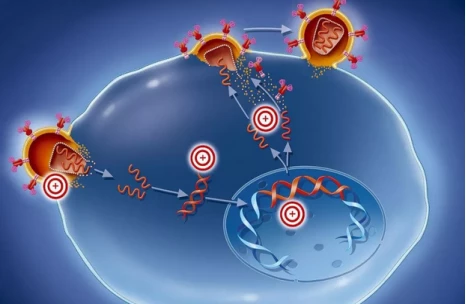Research reveals a new mechanism of TFH cell differentiation

Research reveals a new mechanism of TFH cell differentiation

Copyright © iCell Bioscience Inc, Shanghai 2018-2019
On August 7th, the international academic journal PNAS published the research of Sun Bing Research Group of the Institute of Biochemistry and Cell Biology of the Chinese Academy of Sciences and the Shanghai Pasteur Institute of the Chinese Academy of Sciences, Wang Haikun Research Group, revealing a new mechanism of TFH cell differentiation.

The high-affinity antibodies secreted by B cells and plasma cells are essential for the body to resist and eliminate pathogen infection, while the formation of germinal centers, B cell differentiation and antibody affinity maturation are inseparable from follicular helper T cells (TFH). Supporting role. This type of special helper T cell is localized in the germinal center, which highly expresses surface receptors such as CXCR5, PD1 and ICOS. The key transcription factor of the cell is Bcl6.
Differentiation of TFH cells is regulated by a variety of signaling pathways. In mice, IL-6 and IL-21 are two cytokines that mainly promote the differentiation of TFH cells. Studies have shown that CD4+ T cells with low expression of IL-2Rα tend to differentiate into TFH cells, IL-2-STAT5 signaling. The pathway inhibits TFH cell differentiation mainly by up-regulating Blimp1 expression and down-regulating Bcl6 expression. On this basis, this study further explored the mechanism of TFH cell differentiation and antibody production regulation.
The study found that ECM1-deficient mice showed a significant decrease in TFH cell differentiation, germinal center formation, and antigen-specific antibody secretion; conversely, injecting excess recombinant ECM1 protein into wild-type mice enhanced TFH cell differentiation and germinal center response; Injection of recombinant ECM1 protein into influenza-infected mice enhances TFH cell differentiation and promotes secretion of influenza-specific neutralizing antibodies.
Further mechanism studies have found that ECM1 inhibits the expression of Blimp1 by blocking the IL-2-STAT5 signaling pathway, and promotes the expression of Bcl6, thereby regulating the differentiation of TFH cells. This result reveals that ECM1 protein can positively regulate the differentiation of TFH cells and Antibody production has important scientific significance and potential application value.
 Loading ....
Loading ....
